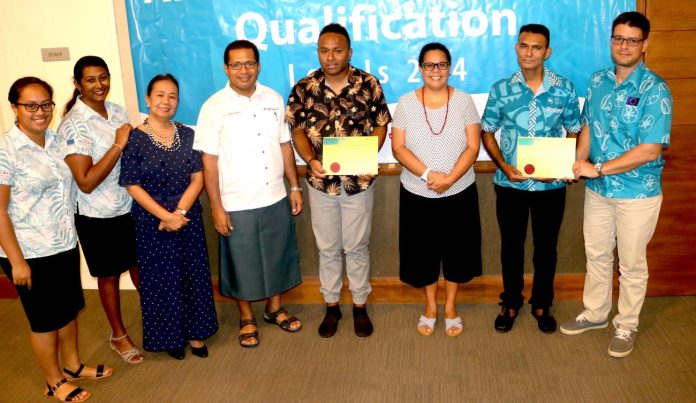Two new Technical and Vocational Education and Training certificate qualifications were launched earlier this month by the Pacific Community’s (SPC) Pacific Adaptation to Climate Change and Resilience Building (PACRES) project.
Certificate 2 in Resilience provides basic theoretical understanding in agriculture, coastal management, fisheries, forestry, water resources, health, energy and infrastructure, and tourism. While Certificate 4 applies the concepts and knowledge acquired in Certificate 2 to address climate change-related issues in communities.
The Regional Certificate 2 and Regional Certificate 4 were accredited by the Pacific Board for Education Quality (PBEQ), which is a subcommittee of the Committee of Representatives of Governments and Administrations (CRGA), SPC’s governing body. The certificates of accreditation were presented by the members of the Educational Quality and Assessment Programme’s (EQAP) Qualifications team to the senior management team of SPC’s Geoscience Energy and Maritime (GEM) division at the launch of the two qualifications.
During the launch, EQAP’s Qualifications Team Leader, Rajendra Prasad, explained that “not only are the qualifications responsive to the capacity-building needs of the region’s climate change adaptation sector, but they are packaged in a way that offers greater flexibility for learners, particularly those at the community level who have experience but lack formal education.”
Prasad added that the TVET qualifications offered a wider scope of knowledge and transferable skills, as well as allowing adequate flexibility for training institutions to contextualise or integrate local knowledge in resilience.
The European Union-funded PACRES project addresses climate change and disaster risk management in the Pacific-ACP region through an integrated approach. SPC is a co-implementor of the PACRES project and leads the Key Result Area 4 which includes the TVET component.
The TVET qualifications in resilience are now registered on the Pacific Qualifications Framework adding to the growing number of TVET courses developed by the GEM division.
GEM’s acting director Rhonda Robinson said making accredited relevant training more accessible was identified as integral to a sustainable and effective strategy forward in strengthening the capacity of communities to manage the impacts of climate change. The Level 2 certificate offers entry to those who have successfully completed Year 10 education or have experience in resilience work at the community level.
Robinson further added that she hopes more young people and those already working in resilience at the community level would take advantage of the qualifications.
“Education is not linear, and it is not pre-set based on your results at school, so I hope this course inspires young people from all backgrounds and all education levels to get hands on and get involved in their communities,” she said. “We are more resilient together in diverse and inclusive ways and young people are our future towards a resilient Pacific.”
The PACRES TVET coordinator, Melinda Mathers said the qualifications are available for the region’s TVET training institutions. “While the PACRES Project is not involved in the implementation per se, we are happy to support by providing TVET tools and equipment so that they can roll out these qualifications,” she said. Fiji’s Ministry of Youth is among the first to indicate interest in delivering the qualifications.
She also encouraged the Pacific’s youth to undertake these qualifications.
“Once they complete these courses, it would mean they are more employable and have more opportunities, and this would make the community more resilient. With benefits ranging from personal, financial, and educational advancements, it would be hard to deny that it is worthwhile completing these qualifications,” said Mathers.
Media contact(s):Rajendra Prasad, Team Leader Qualifications, EQAP, Pacific Community (SPC) | rajendrapr@spc.int
Melinda Mathers, TVET Coordinator, GEM, Pacific Community (SPC) | melindam@spc.int
Irene Manarae, Communications Assistant, EQAP, Pacific Community (SPC) | irenem@spc.int
SOURCE: SPC/PACNEWS


















